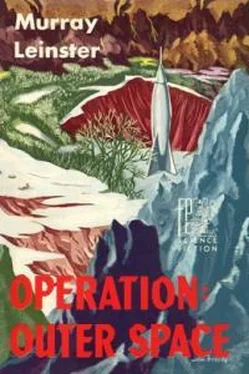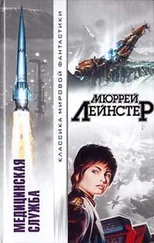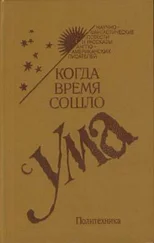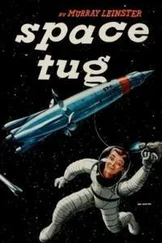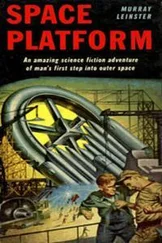Cochrane did not think about anything else for several minutes. He began to recall with new tolerance the insane antics of people he had been producing shows about. They had reason—those imaginary people—to act unreasonably.
But presently his mind was working again.
"We've got to make some plans for ourselves," he said. "We can live back on Earth, of course. We've already made a neat sum out of the broadcasts from this trip. But I don't think we'll want to live the way one has to live on Earth, with too many people there. I'd like—."
Somebody came clattering up the stairs from below.
"Johnny?" It was Bell. "Is he up here?"
Cochrane released Babs.
"No. He's not here. Why?"
"He's missing," said Bell apprehensively. "Alicia says he took a gun. A gun's gone, anyhow. He's vanished!"
Cochrane swore under his breath. A fool asserting his dignity with a gun could be a serious matter indeed. He switched on the control–room lights. He was not there. They went down and hunted over the main saloon. He was not there. Then Holden called harshly from the next deck down.
There was Alicia by the inner airlock door. Her face was deathly pale. She had opened the door. The outer door was open too—and it had not been opened since this last landing by anybody else. The landing–sling cables were run out. They swung slowly in the light that fell upon them from the inside of the ship.
A smell came in the opening. It was the smell of beasts. It was a musky, ammoniacal smell, somehow not alien even though it was unfamiliar. There were noises outside in the night. Grunting sounds. Snortings. There were such sounds as a vast concourse of grazing creatures would make in the night–time, when gathered by thousands and myriads for safety and for rest.
"He—went out," said Alicia desperately. "He meant to punish us. He's a spoiled little boy. We weren't nice to him. And—he was afraid of us too! So he ran away to make us sorry!"
Cochrane went to look out of the lock and to call Johnny Simms back. He gazed into absolute blackness on the ground. He felt a queasy giddiness because there was no hand–railing at the outer lock door and he knew the depth of the fall outside. He raged, within himself. Johnny Simms would feel triumphant when he was called. He would require to be pleaded with to return. He would pompously set terms for returning before he was killed….
Cochrane saw a flash of fire and the short streak of a tracer–bullet's patch before it hit something. He heard the report of the gun. He heard a bellow of agony and then a scream of purest terror from Johnny Simms.
Then, from the ground, arose a truly monstrous tumult. Every one of the creatures below raised its voice in a horrible, bleating cry. The volume of sound was numbing—was agonizing in sheer impact. There were stirrings and clickings as of horns clashing against each other.
Another scream from Johnny Simms. He had moved. It appeared that he was running. Cochrane saw more gun–flashes, there were more shots. He clenched his hands and waited for the thunderous vibration that would be all this multitude of animals pounding through the night in blind stampede.
It did not come. There was only that bleating, horrible outcry as all the beasts bellowed of alarm and created this noise to frighten their assailants away.
Twice more there were shots in the night. Johnny Simms fired crazily and screamed in hysterical panic. Each time the shots and screaming were farther away.
There were no portable lights with which to make a search. It was unthinkable to go blundering among the beasts in darkness.
There was nothing to do. Cochrane could only watch and listen helplessly while the strong beast–smell rose to his nostrils, and the innumerable noises of unseen uneasy creatures sounded in his ears.
Inside the ship Alicia wept hopelessly. Babs tried in vain to comfort her.
The sun rose. Cochrane noted the time, it was fourteen hours since sunset. The local day would be something more than an Earth–day in length. The manner of sunrise was familiar. There was a pale gray light in the sky. It strengthened. Then reddish colors appeared, and changed to gold, and the unnamed stars winked out one after another. Presently the nearer hillsides ceased to be black. There was light everywhere.
Alicia, white and haggard, waited to see what the light would show.
But there was heavy mist everywhere. The hill–crests were clear, and the edge of the visible woodland, and the top half of the ship's shining hull rose clear of curiously–tinted, slowly writhing fog. But everything else seemed submerged in a sea of milk.
But the mist grew thinner as the sun shone on it. Its top writhed to nothingness. All this was wholly commonplace. Even clouds in the sky were of types well–known enough. Which was, when one thought about it, inevitable. This was a Sol–type sun, of the same kind and color as the star which warmed the planet Earth. It had planets, like the sun of men's home world. There was a law—Bode's Law—which specified that planets must float in orbits bearing such–and–such relationships to each other. There must also be a law that planets in those orbits must bear such–and–such relationships of size to each other. There must be a law that winds must blow under ordinary conditions, and clouds form at appointed heights and times. It would be very remarkable if Earth were an exception to natural laws that other worlds obey.
So the strangeness of the morning to those who watched from the ship was more like the strangeness of an alien land on Earth than that of a wholly alien planet.
The lower dawnmist thinned. Gazing down, Cochrane saw dark masses moving slowly past the ship's three metal landing–fins. They were the beasts of the night, moving deliberately from their bed–ground to the vast plains inland. There were bunches of hundreds, and bunches of scores. There were occasional knots of dozens only.
From overhead and through the mist Cochrane could not see individual animals too clearly, but they were heavy beasts and clumsy ones. They moved sluggishly. Their numbers dwindled. He saw groups of no more than four or five. He saw single animals trudging patiently away.
He saw no more at all.
Then the sunlight touched the inland hills. The last of the morning mist dissolved, and there were the dead bodies of two beasts near the base of the ship. Johnny Simms had killed them with his first panicky shots of the night. There was another dead beast a quarter–mile away.
Cochrane gave orders. Jones and Al could not leave the ship. They were needed to get it back to Earth, with full knowledge of how to make other starships. Cochrane tried to leave Babs behind, but she would not stay. Bell had loaded himself with a camera and film–tape besides a weapon, before Cochrane even began his organization. Holden was needed for an extra gun. Alicia, tearless and despairing, would not be left behind. Cochrane turned wryly to Jamison.
"I don't think Johnny was killed," he said. "He'd gotten a long way off before it happened, anyhow. We've got to hunt for him. With beasts like those of last night, there'll naturally be other creatures to prey on them. We might run into anything. If we don't get back, you get to the lawyers I've had representing Spaceways. They'll get rich off the job, but you'll end up rich, too."
"The best bet all around," said Jamison in a low tone, "would be to find him trampled to death."
"I agree," said Cochrane sourly. "But apparently the beasts don't stampede. Maybe they don't even charge, but just form rings to protect their females and young, like musk–oxen. I'm afraid he's alive, but I'm also afraid we'll never find him."
He marshaled his group. Jones had walkie–talkies ready, deftly removed for the purpose from space–suits nobody had used since leaving Lunar City—and Holden took one to keep in touch by. They went down in the sling, two at a time.
Читать дальше
